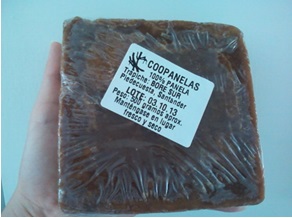This is the second in our series of articles researched and written by students of social communication at the Bolivariana Pontificia University, Colombia, in which students research organisations working in the social/solidarity economy in Bucaramanga region of Columbia and write an article about them. This article looks at the Coopanelas Cooperative. See previous article here. If other universities would like to involve their students in the social economy project in this way, please email socialeconomy@yorksj.ac.uk or tweet @ysjsocialecon
Article in Spanish by Paula Andrea Serrano Gélvez, student of Social Communication, Universidad Pontifícia Bolivariana, Columbia
Translated into English by Charles Hanks, collaborator in the social economy project
The sugar cane (Saccharum officinarum L) “is a giant tropical grass, related to the sorghum and to maize, in the stem of which forms a liquid rich in sucrose, the compound which when extracted and crystallised in the sugar factory is turned into sugar. Sucrose is created by the cane thanks to the energy taken from the sun during photosynthesis”[1]. Although it is not originally a Colombian plant (it comes from South East Asia) the sugar cane has been one of the most important economic sources for this country for many years.
Various activities have developed around the farming of this plant, for example the artisanal production of panela, a type of brown sugar, which is “obtained through the extraction and evaporation of sugar cane juices, and manufactured in what are called panelero sugar mills”[2]. This trade is traditional in various parts of the country, such as Piedecuesta (Santander), where the majority of the work of the Coopanelas cooperative takes place. Part of the third economic sector, the organisation is dedicated to the commercialisation of its members’ products, all produced from sugar cane cultivation, such as panela.
Since 28th November 1939, Coopanelas has helped its members, the majority of them land-owners and farmers, to sell their products at a fair price, as well as offering advice, assistance with crop-growing and sometimes even credits to enhance their economic activity.
Throughout this time the cooperative has not only offered support in the ways mentioned above, but has also educated others on topics such as the cooperative movement, inspiring its members with its key values: solidarity, comradeship and above all a respect for the rules.
According to Luis Enrique Figueroa, Coopanelas “was born, like all good things, of ambition and anxiety. Tax on panela was valued at very little – a laughable price in fact – which forced worried farmers to seek union and solidarity, credo of the cooperative movement, so as to get out of their predicament. And it has continued like this for so many years, bringing together individualist temperaments and unfriendly personal desires – a common trait of farmers by the way – and achieving the miracle, so to speak, of becoming an ‘interpreter’ for the land-owner, the harvester, even the rural worker who amidst the smoke of the sugar mill, dreams of a fairer future”[3].

Sugar cane – cooling down
Despite so many years in operation, the outlook for Coopanelas does not look too encouraging; much of the farmland has been urbanised and as a result production has reduced considerably.
For this reason, among others, the cooperative has considered seeking other fields of action, for example tourism, whereby people can witness the transformation of the sugar cane as well as enjoying a night of tranquility in one of the farm houses. The aim of all this is to preserve the work of the cooperative and perhaps establish themselves as a heritage site for the region, where the work of many generations comes together around the sugar cane.
[1] PERAFÁN, Felipe. La caña de azúcar [on line] < http://www.perafan.com/azucar/ea02cana.html> [cited 11th November 2013, translation C. Hanks]
[2] PAVA CAPACHO, Germán. PIEDECUESTA PROYECCIÓN Y POTENCIAL TURÍSTICO [on line]. <http://coopanelas.com/wp-content/uploads/2013/05/proyeccion_turistica1.pdf> [cited 27th October2013, translation C. Hanks]


